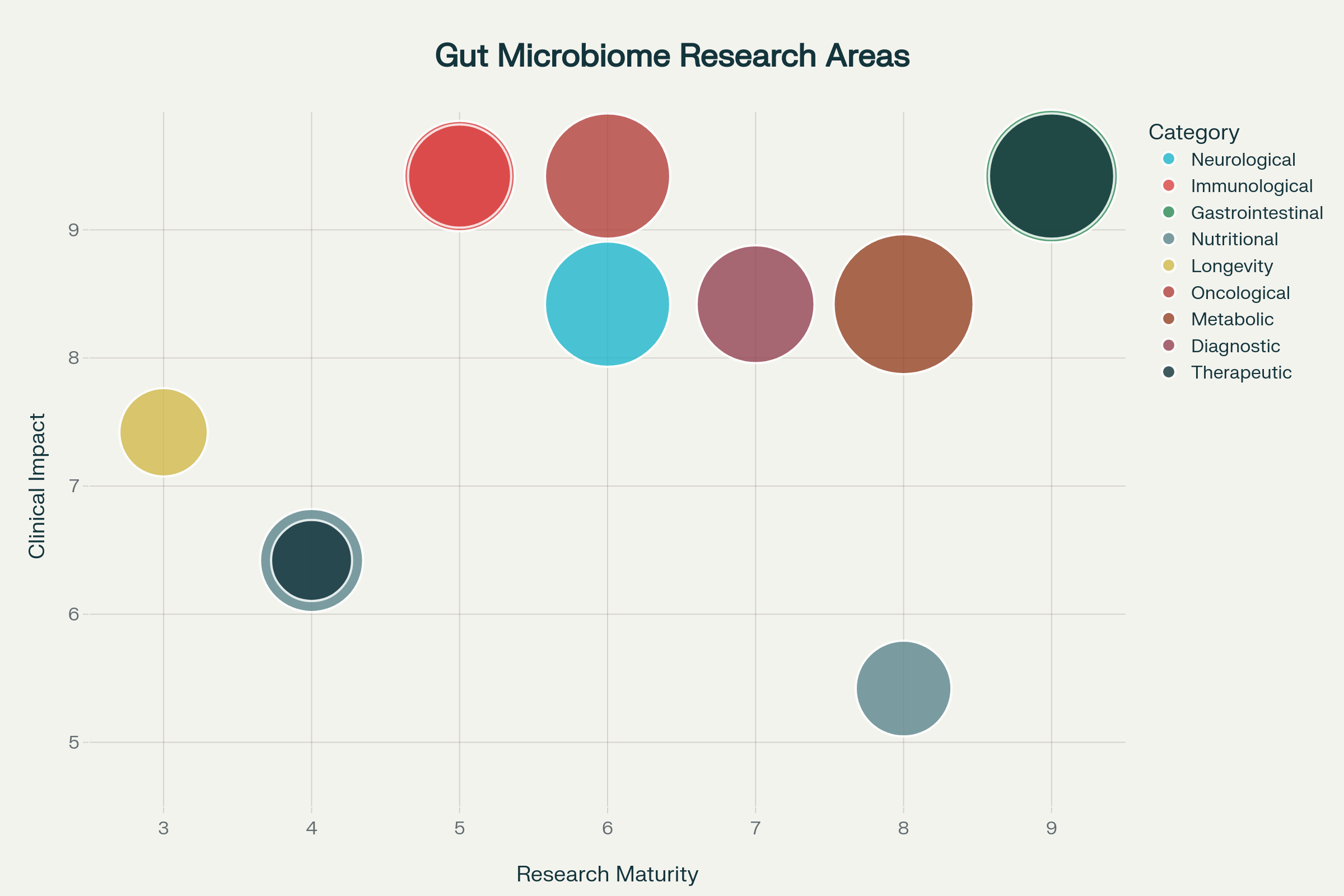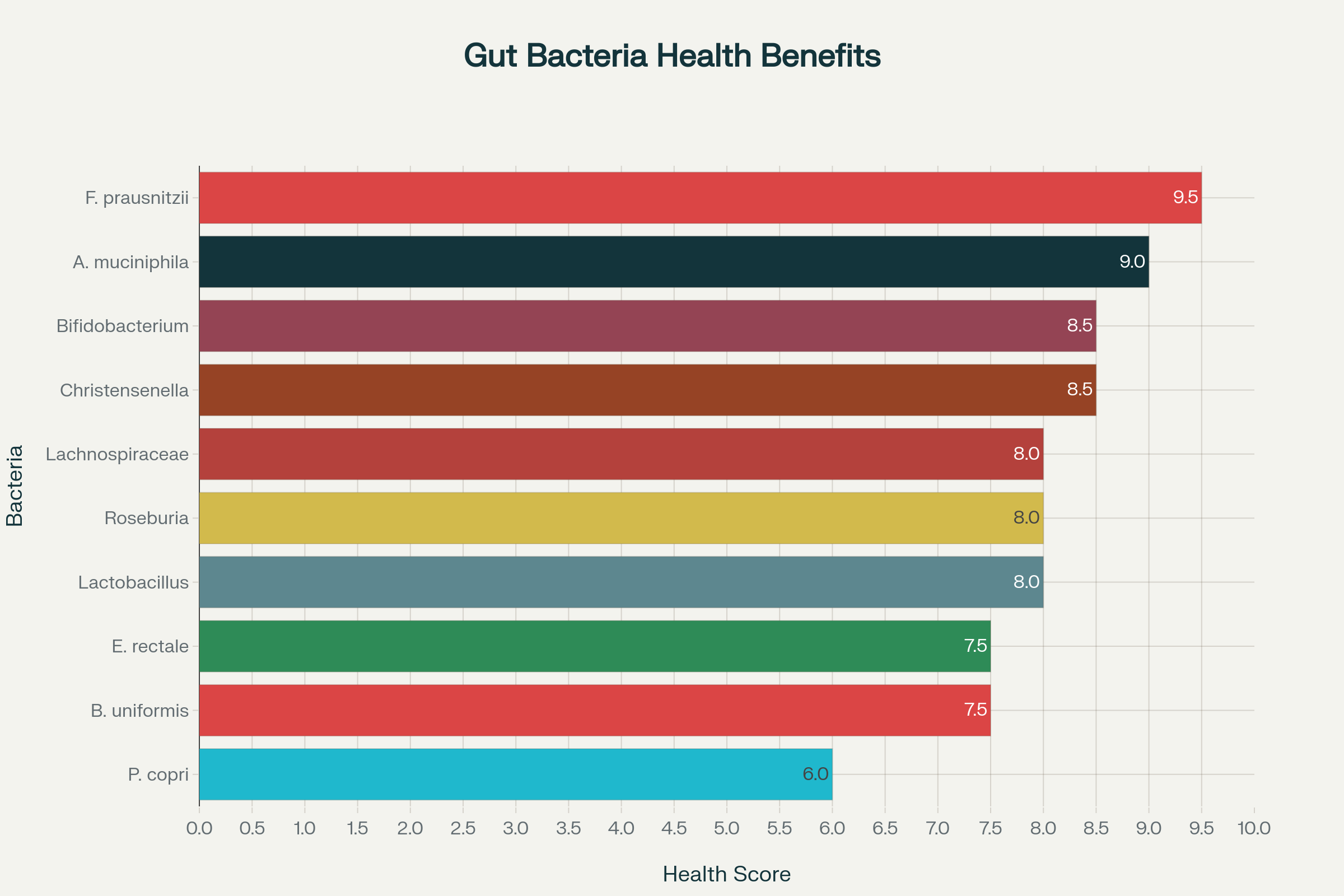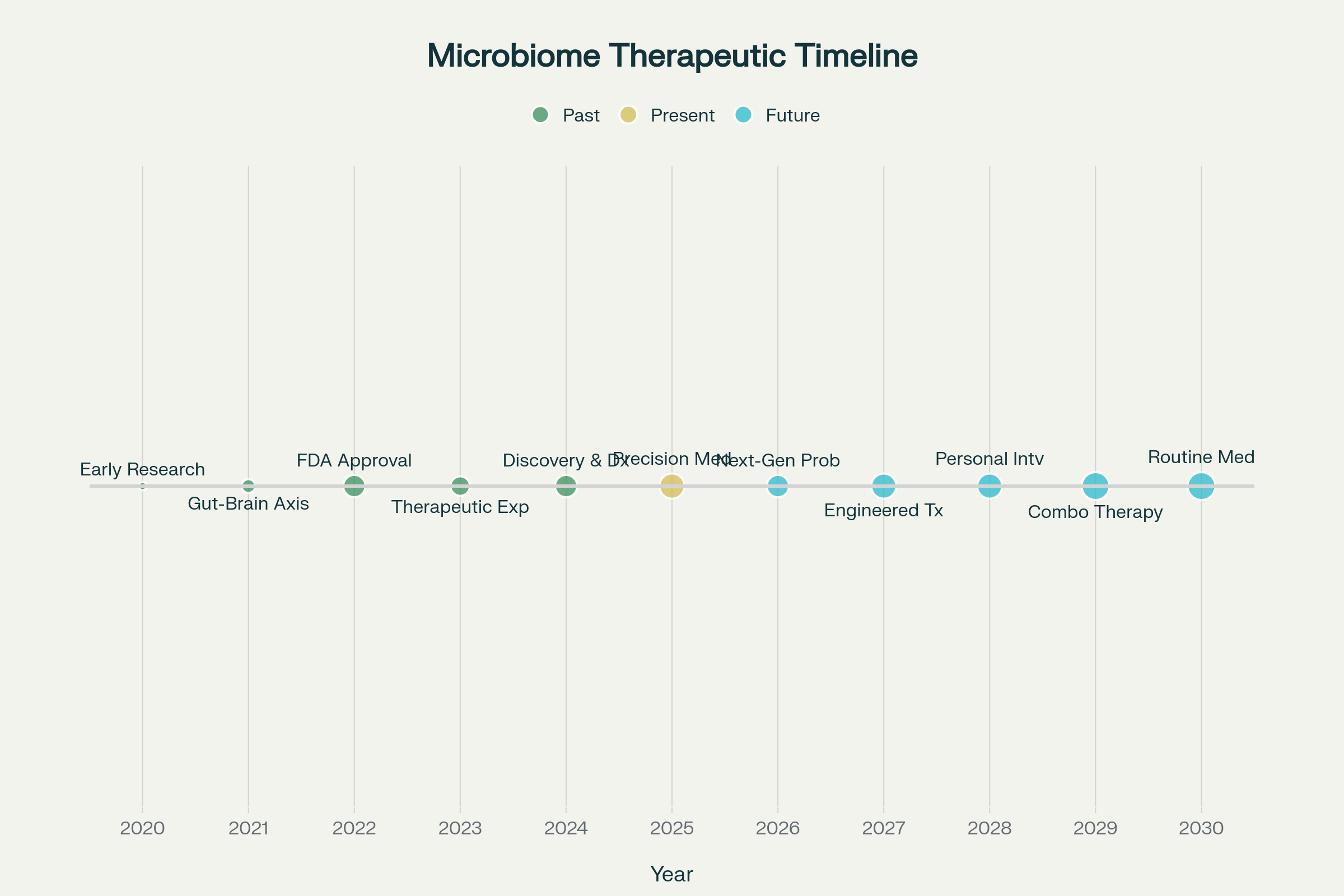The gut microbiome has emerged as one of the most fascinating frontiers in modern medicine, revolutionising our understanding of human health and disease. Recent groundbreaking research reveals that these trillions of microorganisms residing in our digestive tract function as a “second brain”, influencing everything from mental health to immune function and longevity.

Current landscape of gut microbiome research showing maturity levels, clinical impact potential, and investment interest across different therapeutic areas
Revolutionary Discoveries in Microbiome Research
The Gut-Brain Connection Breakthrough
Recent studies from leading institutions have unveiled the profound gut-brain axis connection, demonstrating how beneficial bacteria directly influence neurological health. Stanford Medicine researchers discovered that fermented foods significantly increase microbiome diversity whilst reducing inflammatory markers by up to 19 proteins. This research fundamentally challenges traditional approaches to mental health treatment.lunduniversity.lu+1
Scientists have identified specific bacterial strains that produce neurotransmitters including serotonin and dopamine. Faecalibacterium prausnitzii, considered the most beneficial gut bacteria, generates short-chain fatty acids that cross the blood-brain barrier, directly affecting mood regulation and cognitive function.nutritionsource.hsph.harvard+1
Immune System Modulation Advances
The latest research from Cleveland Clinic identified Tomasiella immunophila, a previously unknown bacterium that weakens gut immunity, potentially contributing to inflammatory bowel disease. This discovery opens new therapeutic pathways for treating autoimmune conditions through targeted microbiome intervention.sciencedaily+1

Key beneficial gut bacteria and their documented health benefit scores based on current research evidence
Studies demonstrate that gut bacteria regulate 80% of our immune system, with beneficial strains like Akkermansia muciniphila strengthening intestinal barriers whilst Bifidobacterium species enhance pathogen resistance. These findings suggest that microbiome-based therapies could revolutionise autoimmune disease treatment.frontiersin+1
Precision Medicine and Personalised Nutrition
Microbiome-Informed Healthcare
Researchers have developed sophisticated machine learning algorithms that predict individual responses to dietary interventions based on gut microbiota composition. These digital twin models of gut metabolism enable personalised nutrition recommendations, moving beyond one-size-fits-all dietary advice.nature+1
Metagenomic sequencing now allows clinicians to identify dysbiosis patterns associated with specific diseases. Advanced diagnostic tools using multiplex droplet digital PCR achieve over 90% accuracy in distinguishing inflammatory bowel disease from healthy controls.gutmicrobiotaforhealth
Therapeutic Applications
The field has witnessed remarkable therapeutic advances, with Rebyota becoming the first FDA-approved microbiome-based medicinal product for recurrent Clostridioides difficile infections. Following closely, VOWST capsules received approval, marking a paradigm shift towards microbiome therapeutics.healthline+1

Timeline of gut microbiome therapeutic development from 2020-2030 showing major milestones and projected advances
Fecal microbiota transplantation (FMT) shows extraordinary promise, achieving 90% success rates in treating antibiotic-resistant infections whilst demonstrating potential for metabolic disorders and neurodegenerative diseases.news.mit+1
Groundbreaking Research in Disease Prevention
Cancer and Microbiome Interactions
Pioneering research reveals how gut bacteria influence cancer immunotherapy effectiveness. Specific bacterial strains enhance immune checkpoint inhibitor responses, whilst others promote treatment resistance. Scientists are developing precision oncology approaches combining microbiome analysis with traditional cancer treatments.microbiomejournal.biomedcentral+1
Fusobacterium nucleatum and Bacteroides fragilis serve as biomarkers for colorectal cancer detection, enabling non-invasive screening methods with higher sensitivity than traditional tests.frontiersin
Metabolic Health Breakthroughs
Recent studies demonstrate that gut microbiome composition predicts postprandial glucose responses more accurately than genetic factors. Christensenellaceae bacteria, strongly influenced by host genetics, correlate with longevity and lean body mass maintenance.dsm-firmenich+1
Mediterranean diet interventions consistently increase beneficial SCFA-producing bacteria like Roseburia and Eubacterium rectale, reducing cardiovascular risk factors and systemic inflammation.nature+1
Ageing and Longevity Research
Microbiome Changes Across Lifespan
Longitudinal studies tracking over 9,000 individuals reveal that older adults with unique microbiome patterns exhibit superior health outcomes and increased survival rates. Centenarians maintain higher microbial diversity compared to younger elderly populations.dsm-firmenich+1
Alpha diversity increases with healthy ageing, whilst specific bacteria like Akkermansia become more abundant. These longevity-associated microbes produce metabolites that reduce inflammaging and support healthy brain function.nature+1
Anti-Ageing Interventions
Research demonstrates that metformin, beyond its diabetic benefits, extends lifespan partly through microbiome modulation. The drug promotes SCFA production whilst reducing gut permeability and systemic inflammation.pmc.ncbi.nlm.nih
Advanced Therapeutic Strategies
Next-Generation Probiotics
Scientists are developing engineered probiotics and synthetic microbial communities designed for specific therapeutic outcomes. These next-generation probiotics overcome limitations of traditional supplements, offering targeted interventions for dysbiosis-related disorders.pmc.ncbi.nlm.nih+1
Postbiotics—bioactive compounds produced by beneficial bacteria—emerge as promising alternatives to live probiotics. Butyrate, bacteriocins, and other metabolites provide therapeutic benefits without requiring live microorganisms.npr+1
Diagnostic Innovation
Modern microbiome testing employs 16S ribosomal RNA sequencing and whole genome shotgun sequencing to provide comprehensive gut health assessments. These technologies identify pathogenic bacteria, assess microbial diversity, and predict disease susceptibility.frontiersin+1
Volatile organic compound analysis offers rapid diagnostic capabilities, potentially predicting conditions like sepsis hours before conventional methods.pmc.ncbi.nlm.nih
Practical Applications and Implementation
Clinical Translation
Healthcare systems worldwide are integrating microbiome-based diagnostics into routine practice. Point-of-care testing enables real-time gut health monitoring, facilitating personalised treatment adjustments.sciencedirect+1
Regulatory frameworks are evolving rapidly to accommodate microbiome therapeutics. The European Substances of Human Origin regulation provides guidelines for developing microbiome-based medicinal products.healthline
Lifestyle Interventions
Research confirms that lifestyle modifications significantly impact microbiome composition. Regular exercise, adequate sleep, and stress management promote beneficial bacterial growth whilst reducing pathogenic microbes.lunduniversity.lu+1
Fermented foods including kimchi, kefir, and sauerkraut demonstrate superior effects compared to fiber supplementation for increasing microbiome diversity.newsroom.clevelandclinic+1
Future Directions and Challenges
Emerging Technologies
Artificial intelligence and deep learning applications are revolutionising microbiome research. These technologies enable precision nutrition recommendations and predict therapeutic responses with unprecedented accuracy.gutmicrobiotaforhealth+1
CRISPR gene editing allows researchers to engineer beneficial bacteria for specific therapeutic functions, potentially addressing antimicrobial resistance and metabolic dysfunction.nature+1
Research Priorities
Current challenges include standardising microbiome analysis methods, establishing healthy microbiome definitions, and developing validated biomarkers for clinical use. International collaborations focus on creating comprehensive reference databases representing diverse populations.healthline+1
Frequently Asked Questions
What is the gut microbiome?
The gut microbiome comprises trillions of bacteria, fungi, viruses, and other microorganisms inhabiting the digestive tract. These microbes perform essential functions including nutrient metabolism, immune system regulation, and neurotransmitter production.
How can I improve my gut microbiome?
Consume diverse fermented foods, prebiotic fiber, and maintain regular exercise whilst avoiding unnecessary antibiotics. Mediterranean diet patterns consistently promote beneficial bacterial growth.
What are the signs of an unhealthy gut microbiome?
Symptoms include digestive issues, frequent infections, mood disorders, food intolerances, and autoimmune conditions. Professional microbiome testing provides accurate assessment.
How long does it take to improve gut health?
Microbiome changes can occur within days of dietary modifications, though significant improvements typically require 2-4 weeks of consistent healthy lifestyle practices.
Are probiotic supplements effective?
Next-generation probiotics show promise, though whole food sources like fermented foods often provide superior benefits. Consult healthcare providers before starting supplements.
Can gut health affect mental health?
Yes, the gut-brain axis directly influences mood, cognition, and mental health through neurotransmitter production and inflammatory pathways. Microbiome-targeted interventions show potential for treating depression and anxiety.
The gut microbiome revolution continues reshaping medical understanding, offering unprecedented opportunities for personalised medicine and disease prevention. As research progresses, microbiome-based therapies promise to transform healthcare delivery, providing targeted, effective treatments for numerous conditions whilst promoting optimal health throughout life.
- https://www.lunduniversity.lu.se/article/key-takeaways-latest-research-gut-bacteria
- https://newsroom.clevelandclinic.org/2024/09/26/cleveland-clinic-researchers-discover-new-bacterium-that-causes-gut-immunodeficiency
- https://nutritionsource.hsph.harvard.edu/microbiome/
- https://medicine.yale.edu/news-article/gut-microbiome-changes-linked-to-multiple-sclerosis-ms-new-study-finds/
- https://www.sciencedaily.com/releases/2024/09/240926144904.htm
- https://pmc.ncbi.nlm.nih.gov/articles/PMC9455721/
- https://www.frontiersin.org/journals/microbiology/articles/10.3389/fmicb.2025.1549160/full
- https://masseyeandear.org/news/press-releases/2024/02/scientists-discover-18-new-species-of-gut-microbes
- https://www.nature.com/articles/s41430-021-00991-6
- https://www.gutmicrobiotaforhealth.com/clinical-translation-of-microbiome-research-takeaways-from-the-2025-gmfh-summit/
- https://www.gutmicrobiotaforhealth.com/key-advances-in-the-gut-microbiome-during-2024/
- https://www.healthline.com/nutrition/gut-microbiome-and-health
- https://www.nature.com/subjects/microbiome
- https://news.mit.edu/2024/human-gut-bacteria-rarely-update-their-crispr-defense-systems-1223
- https://www.nature.com/articles/s41392-022-00974-4
- https://microbiomejournal.biomedcentral.com/articles
- https://pmc.ncbi.nlm.nih.gov/articles/PMC11404604/
- https://www.frontiersin.org/journals/microbiology/articles/10.3389/fmicb.2022.999001/full
- https://www.dsm-firmenich.com/en/businesses/health-nutrition-care/news/talking-nutrition/the-future-of-gut-health-5-breakthrough-trends-from-probiota-2025.html
- https://www.nature.com/articles/d41586-024-00266-7
- https://www.nature.com/articles/s41598-025-86858-3
- https://pmc.ncbi.nlm.nih.gov/articles/PMC10146621/
- https://med.stanford.edu/news/all-news/2021/07/fermented-food-diet-increases-microbiome-diversity-lowers-inflammation.html
- https://link.springer.com/article/10.1007/s12035-025-04846-0
- https://pmc.ncbi.nlm.nih.gov/articles/PMC10384867/
- https://pmc.ncbi.nlm.nih.gov/articles/PMC9003261/
- https://pmc.ncbi.nlm.nih.gov/articles/PMC12025253/
- https://www.npr.org/sections/shots-health-news/2024/06/24/nx-s1-5018044/gut-microbiome-microbes-mental-health-stress
- https://www.health.harvard.edu/blog/fermented-foods-for-better-gut-health-201805161607
- https://www.frontiersin.org/journals/neuroanatomy/articles/10.3389/fnana.2025.1504065/full
- https://www.nature.com/articles/s41598-021-94498-6
- https://pmc.ncbi.nlm.nih.gov/articles/PMC8588917/
- https://www.sciencedirect.com/science/article/pii/S0924224425001165
- https://www.sciencedirect.com/science/article/abs/pii/S1876201824001618
- https://www.nature.com/articles/s41575-020-00390-5
- https://med.stanford.edu/news/insights/2025/03/gut-brain-connection-long-covid-anxiety-parkinsons.html
- https://www.cas.org/resources/cas-insights/how-your-gut-microbiome-linked-depression-and-anxiety
- https://www.sciencedirect.com/science/article/pii/S2772753X23002034
- https://pubmed.ncbi.nlm.nih.gov/40234288/
- https://www.nature.com/articles/s41598-024-53929-w
- https://www.frontiersin.org/journals/immunology/articles/10.3389/fimmu.2024.1365554/full
- https://pmc.ncbi.nlm.nih.gov/articles/PMC8720971/
- https://isbscience.org/news/health/a-new-path-toward-microbiome-informed-precision-nutrition/
- https://pubmed.ncbi.nlm.nih.gov/29920643/
- https://pubmed.ncbi.nlm.nih.gov/21857074/
- https://pmc.ncbi.nlm.nih.gov/articles/PMC5730337/
- https://academic.oup.com/rheumatology/article/63/3/856/7226506
- https://www.mayoclinic.org/diseases-conditions/inflammatory-bowel-disease/diagnosis-treatment/drc-20353320
- https://academic.oup.com/nsr/article/12/6/nwaf148/8114801
- https://link.springer.com/article/10.1007/s40588-023-00213-6
- https://my.clevelandclinic.org/health/diseases/15587-inflammatory-bowel-disease
- https://www.gutmicrobiotaforhealth.com/the-gut-microbiome-in-personalized-nutrition-and-medicine-takeaways-from-the-2022-gmfh-summit/
- https://www.nature.com/articles/s41422-020-0332-7
- https://nyulangone.org/conditions/inflammatory-bowel-disease/treatments/medication-for-inflammatory-bowel-disease
- https://pubmed.ncbi.nlm.nih.gov/40505617/
- https://www.sciencedirect.com/science/article/pii/S2949834124000023
- https://www.webmd.com/ibd-crohns-disease/inflammatory-bowel-syndrome
- https://www.sciencedirect.com/science/article/abs/pii/S2468867321000572
- https://pmc.ncbi.nlm.nih.gov/articles/PMC6300652/
- https://www.ucsfhealth.org/education/nutrition-tips-for-inflammatory-bowel-disease
- https://www.nia.nih.gov/news/unique-gut-microbiome-patterns-linked-healthy-aging-increased-longevity
- https://blog.crownbio.com/understanding-the-microbiome-using-genomic-sequencing-and-analysis
- https://bodybio.com/blogs/blog/prebiotics-vs-probiotics-vs-postbiotics
- https://pmc.ncbi.nlm.nih.gov/articles/PMC7762384/
- https://pmc.ncbi.nlm.nih.gov/articles/PMC7598837/
- https://longevity.stanford.edu/lifestyle/2024/04/08/probiotics-prebiotics-and-postbiotics-what-are-they-and-why-are-they-important/
- https://www.frontiersin.org/journals/aging/articles/10.3389/fragi.2025.1452917/full
- https://pmc.ncbi.nlm.nih.gov/articles/PMC4383038/
- https://www.frontiersin.org/journals/nutrition/articles/10.3389/fnut.2024.1355542/full
- https://genomemedicine.biomedcentral.com/articles/10.1186/s13073-025-01493-x
- https://eurofinsgenomics.eu/en/eurofins-genomics/material-and-methods/microbiome-sequencing/
- https://pubmed.ncbi.nlm.nih.gov/39599742/
- https://www.xiahepublishing.com/2472-0712/ERHM-2024-00008
- https://academic.oup.com/bib/article/22/1/178/5678919
- https://pmc.ncbi.nlm.nih.gov/articles/PMC10625129/
- https://www.nature.com/articles/s41575-022-00605-x
- https://www.cosmosid.com/blog/how-do-you-sequence-a-microbiome-5-steps-explained/
- https://www.mayoclinic.org/healthy-lifestyle/nutrition-and-healthy-eating/expert-answers/probiotics/faq-20058065
- https://www.sciencedirect.com/science/article/pii/S2468501120300146
- https://www.thermofisher.com/in/en/home/life-science/sequencing/sequencing-learning-center/next-generation-sequencing-information/microbiome-research/microbiome-analysis.html
- https://www.nature.com/articles/s41522-025-00683-0
- https://www.nature.com/articles/s41591-024-03280-4
- https://academic.oup.com/proteincell/article/14/10/709/7176102
- https://www.sgs.com/en/news/2025/01/designing-effective-clinical-trials-for-microbiome-based-products
- https://mydiagnostics.in/products/microbiome-analysis
- https://pmc.ncbi.nlm.nih.gov/articles/PMC12010094/
- https://drug-dev.com/drug-development-the-promise-of-cutting-edge-microbiome-based-therapeutics/
- https://pmc.ncbi.nlm.nih.gov/articles/PMC8206793/
- https://www.abcam.com/en-us/stories/articles/whats-next-in-microbiome-research
- https://pmc.ncbi.nlm.nih.gov/articles/PMC8972995/
- https://gut.bmj.com/content/68/6/1014
- https://pmc.ncbi.nlm.nih.gov/articles/PMC11149097/
- https://www.frontiersin.org/journals/immunology/articles/10.3389/fimmu.2025.1559480/full
- https://pmc.ncbi.nlm.nih.gov/articles/PMC12126222/
- https://www.sciencedirect.com/science/article/pii/S2589555924002386
- https://pmc.ncbi.nlm.nih.gov/articles/PMC9315466/
- https://www.frontiersin.org/journals/cellular-and-infection-microbiology/articles/10.3389/fcimb.2024.1377012/full
- https://link.springer.com/article/10.1007/s40265-024-02107-3
- https://www.sciencedirect.com/science/article/pii/S2666144619300097




